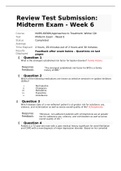Exam (elaborations)
NURS 6630N Week 6 Midterm Exam (Winter Qtr)
- Course
- NURS 6630 (NURS6630N)
- Institution
- Walden University
1. Question: What is the strongest established risk factor for bipolar disorder? 2. Question: Which of the following medications are known as selective serotonin re-uptake inhibitors (SSRIs)? 3. Question: Which disease state of a non-adherent patient is at greater risk for substance use, violence...
[Show more]



